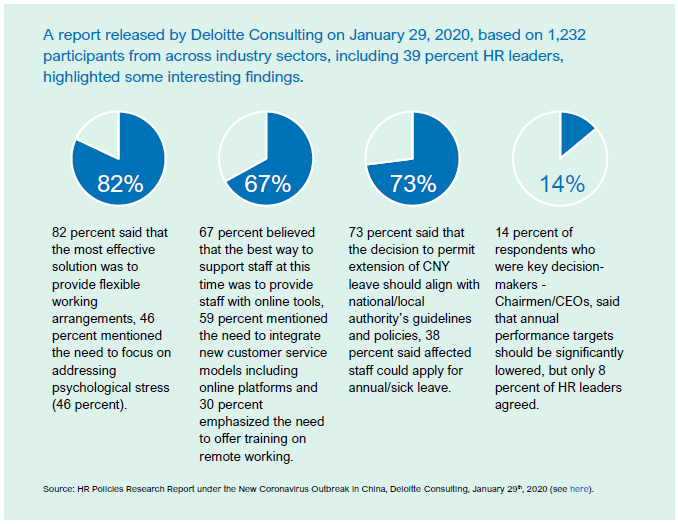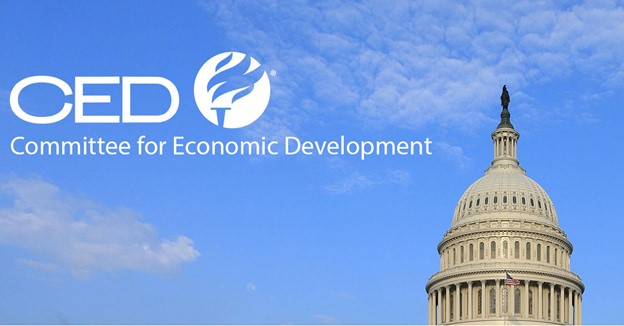Managing through the Coronavirus Crisis: Selected Ideas and Learnings for Asia's HR Leaders
February 13, 2020 | Report
For HR leaders, the coronavirus outbreak (COVID-19) is fraught with challenges. Assuring staff safety and well-being while supporting business goals is delicate and risky balancing act, especially at this volatile and uncertain stage of the outbreak. Below, please find an assemblage of HR ideas and learnings we’ve synthesized through ongoing conversations with our experts, research peers and thought partners. We hope that some of these will help inform your thinking, plans and responses. (This list is not arranged in any order of priority.)
Key Must Dos and Get Rights
- Develop and continually update an Organizational Response Plan to ensure timely and clear communication on the quickly evolving situation, including relevant situational assessments and associated organizational responses, policy notices and procedural updates.
- Coordinate closely with local and national authorities to ensure full compliance with unfolding regulatory policies. When necessary, provide context around changing compliance requirements to assure clear understanding and enthusiastic organizational uptake.
- Prepare a curated Resources Directory that directs staff to pre-qualified, credible sources of information and discourages the use and dissemination of information from unreliable sources (sometimes “fake news”) circulating widely on social media and chat apps.
- Set up channels to facilitate open communication and exchange with staff enabling them to “safely” share personal dilemmas, challenges and needs, and encouraging them to seek support from the HR team, their managers and colleagues. Be sure to maintain compliance with all relevant privacy laws regarding personnel data and the personal circumstances of employees, and clearly communicate these requirements to all cohorts who need to know.
- Activate a Business Continuity Committee to ensure that essential business functions and customer interfaces suffer minimal disruption, and to take critical, possibly unprecedented, policy decisions on short notice to protect the interests of staff, clients, partners, and other business resources.
- Appoint Operations and Risk Management Leaders to assess and mitigate evolving risk scenarios and to swiftly operationalize new action plans and measures in coordination with authorities.
- Offer flexibility for staff to work remotely in the interest of their own safety and that of colleagues. While certain jobs may require physical presence, HR should make this determination on case-by-case basis and promulgate transparent policies to reduce uncertainty.
- Develop guidelines for remote working arrangements and engage IT to provide staff, including contractors, with the necessary infrastructure and resources required to work efficiently and effectively from outside the office.
- Encourage staff to conduct meetings virtually and avoid non-essential in-person interactions with colleagues and external parties. Provide staff with simple email scripts that they can use to politely and graciously request virtual meetings.
- Procure and provide essential supplies like masks and sanitizers to all staff. Ensure regular temperature checks and disinfection of lavatories, pantries, elevators, and other high-traffic areas.
- Pay special attention to staff in certain jobs that may be at higher risk (ex: tellers, receptionists, floor sales/service staff, medical staff and counsellors), and make special arrangements to ensure those staff are safe and feel comfortable in their work.
- Develop and rehearse game-plans and Response Routines for specific emergencies, for example:
- Staff who have infected or at-risk family members
- Staff who become infected out of office
- Infected staff or visitors who visit office
- Staff who return from a scene of infection
- Staff suspected of becoming infected – traced to a scene of infection or infected person
- For each case: quarantine arrangements, transport and logistics arrangements, recommended medical facilities and resources, and communications procedures, etc. should be detailed in full, including contingency back-up plans.
- Reinforce key public health messages about the need for greater attention to personal hygiene and the exercise of social responsibility – e.g. wearing face masks, washing hands, not touching face, and even self-isolation (if one experiences
- Continually communicate the corporate support and resources available to staff. This will enhance workplace safety and build trust in company leadership, demonstrating the commitment of company leaders to employee wellbeing. The company’s response will shape your employer brand well beyond the crisis period.
- Collaborate with top management to secure budgets for unforeseen expenses including, for example, additional medical insurance or emergency coverage for affected or vulnerable staff, cancellation costs for travel/meetings/events, purchase of essential supplies like masks, sanitizers, and provision of temporary IT and telecommunication services for those working remotely.
- Revisit travel policies and communicate any Special Travel Advisories including restrictions around travel to mainland China and/or other seriously affected places. Be sure to synchronize with unfolding guidelines from local and regional authorities and the World Health Organization (WHO).
- Develop Staffing Contingency Plans to mitigate business continuity risks if some staff are unable to return to work as planned because of travel restrictions, travel disruptions, and/or quarantine requirements. Consider creative measures including job-sharing, hiring of temporary staff, and professional contractors. This may also require working closely with local regulatory agencies to procure appropriate work authorizations.
Key Mistakes Not to Make
- Creating a “one-size-fits-all” policy set that may not be feasible or flexible enough to address the needs of specific staff and/or work units. Appreciate that your staff members may have been impacted in unique and different ways. Some flexibility, including provision of discretionary budgets for managers to employ ad hoc point-solutions, may be necessary so that they feel empowered to make swift decisions.
- Keeping global operations in the dark. Outside of Greater China operations, the anxieties and concerns of regional and global staff need to be addressed as well. You have a critical role to play in educating your broader global organization about the on-the-ground realities in China, and the evolving situation in Asia, so that they are able to understand the situation more clearly and demonstrate empathy and support towards their colleagues in Asia, and anticipate and accommodate any work disruptions they may experience vis-à-vis their team members based in Asia.

- Overlooking the personal financial impacts on your affected staff. Develop policies and allocate the resources needed to provide financial support to staff who are undergoing quarantine. Treating their absence as “unpaid leave” will simply add to their stress and financial burden at an already challenging time. Expecting them to forego salary for reasons beyond their control may be seen as unfair and undermine organizational trust well into the future.
- Underestimating adverse and long-term psychological impact on your staff. This is a time to show empathy and compassion not only as an HR leader but also as an organization. It is a time when emotions are running high, and people are affected more deeply, at the psychological level, than you may fathom. Encourage open communication and embrace their personal challenges as your own. For example, a staff member may be anxious about family or community members who have been infected by COVID-19, quarantined, or run the risk of being infected by close contacts, experience hardships relating to childcare due to extended school closures and/or the family’s domestic helpers being unable to return to work due to travel restrictions or income loss of a spouse/partner.
Key Things Not to Overlook
- Determine the nature of special support needed by your China staff in Hubei and other affected cities such as flexible work arrangements, preventive care, additional insurance, special emergency funds for medical expenses and food-and-supply support for quarantine cases.
- Recalibrate business performance expectations and annual KPIs. For most, 2020 revenues and profits are likely to be adversely impacted. You will need to lead strategic discussions with business leaders about the potential impacts on annual performance goals and KPIs that reflect the on-the-ground realities of unavoidable business disruptions. Transparent adjustment procedures for performance measures should be developed and communicated. These decisions must be very carefully considered because they could have a long-term impact on year-end total compensation, and staff morale and loyalty.
- Guard against “conscious biases”. Protect your affected staff (from China, and Hubei especially, or those who have recently visited high-risk locations) from xenophobia and/or prejudices, both inside and outside the workplace. Several such cases of discrimination against specific communities are being reported across the world – for example landlords refusing to let tenants from mainland China return to their rental accommodations, even if they are infection-free and after being legitimately quarantined. Timely counselling services and even financial support may be needed in certain cases.
- Ensure that your top leaders are visible and engaged. As in any crisis, your top leaders must make their presence felt through direct communications – emails, webcasts, townhalls, etc. This will go a long way in building morale and assuring your staff that the organization truly cares. You will need to play an active role in orchestrating the participation of your leaders in timely and impactful engagement with staff.
- Don’t forget to take good care of yourself. At a personal level, while you step-up to be a “rock” for your people, this situation could silently take a toll on your own physical and mental well-being. Be sure to take good care of your own needs in this regard and reach out to friends, family and colleagues for support as needed.
This is clearly a trying time for HR leaders across Asia – a time when you are required to be a strong champion of your people, while at the same time, balance business goals. This is a great opportunity for the HR community to band together, exchange notes and create a socio-emotional support network. (To listen to our latest podcast on the economic implications of the coronavirus outbreak, please click here).
We hope that this list of ideas and practices will be helpful as you navigate the complexities of the COVID-19 crisis. Please do not hesitate to reach out to our Human Capital expert team for a quick chat or meeting if needed – we are here to help.
AUTHOR

Human Capital Center Leader, Asia and Program Director of Asia Inclusion Council, Asia CHRO Council
The Conference Board


